From the lush and rolling Blue Ridge Mountains, to the exotic depths of central and south Florida, to the steep and glaciated peaks of Patagonia, students on the Blue Ridge Mountains to Florida and Patagonia Leadership Semester spend 72 days honing leadership skills, practicing compassion, building teamwork and pushing themselves in a wide variety of ecosystems throughout North and South America.
If this seems difficult to fathom, don’t worry- we are here to help. What follows is a breakdown of the elements of the Blue Ridge Mountains to Florida and Patagonia Leadership Semester and what a student can expect to experience while on this course. The sequence described is the progression for the fall semester course, but the content of each phase can also be applied to the spring semester course.
Blue Ridge Mountains Phase
Phase 1 for Fall Semesters (Phase 3 for Spring Semesters)
After meeting their group at the airport, semester students are transported to their course start location. Once they have arrived, students go through what is known as a “duffel shuffle.” All the necessary gear for the phase is removed from suitcases and sorted according to the progression of the phase. Students will have access to this gear at resupplies according to when they need it. Once the gear is sorted, it is packed up and unneeded belongings and valuables are taken back to the base camp for safekeeping. After this is complete, students jump in to learning the skills they’ll need to live successfully in the backcountry.
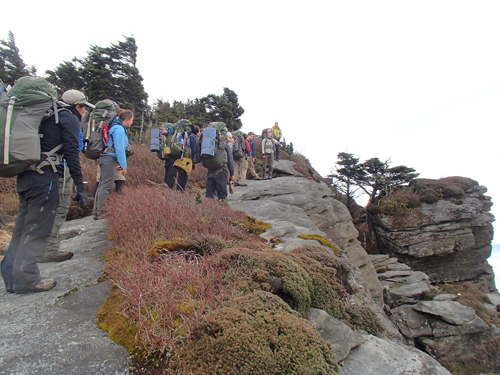
The crew hikes third and fourth class terrain as they traverse Grandfather Mountain, near Linville, NC
Rock Climbing
One skill block the crew will participate in is the climbing block. During this block students start with the basics, from learning about gear to the proper belay techniques. Belaying is an essential part of rock climbing that allows the climber to remain safe, even when they are hundreds of feet off the ground. After the basics become smooth and seamless, students move on to learn special climbing-specific knots and hitches, climbing movement and technique, how to rappel and other foundational principles of climbing.
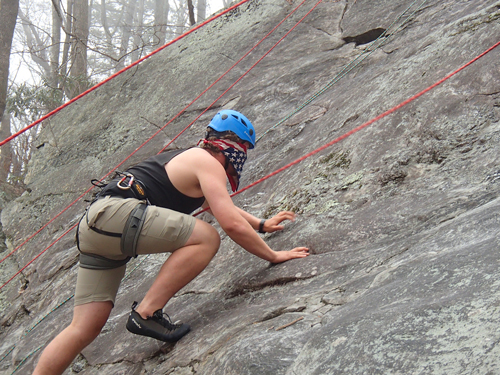
For an extra challenge, students try rock climbing with a blindfold on!
Student may also have the opportunity to learn more complex aspects of rock climbing, like anchor building, lead belaying or rescues. Ultimately, the students work up to a multi-pitch climb, where they put all their skills together to climb multiple rope lengths up the side of a mountain until they reach the summit.
I had never been rock climbing before this course, but I was able to learn from the very beginning and work all the way up to a multi-pitch climb in only three days! It felt powerful, learning a new skill and then putting it to the test right away and succeeding at that. -Nick Taylor, semester alum
Getting to multi-pitch climb after having just learned the skills was amazing; I felt trusted and independent, like they knew I could do it. -Chase Flynn, semester alum
Ropes Course
Students may also participate in a high ropes course during the Blue Ridge Mountains phase. Ropes courses have a rich history and were actually invented by Outward Bound to serve as recreations of the rigging of ships. The courses were so effective in building teamwork, self-reliance, confidence and fitness that variations of these courses have since been incorporated into leadership programs worldwide. Ropes courses provide the opportunity for participants to push themselves through several different elements high in the canopy of the forest.
Canoeing
Another skill block students will encounter in the Blue Ridge Mountain phase is the river block, which begins with basic skill acquisition. Students learn the essential strokes for successfully paddling and steering a tandem whitewater canoe and how to keep themselves safe should they have an “out-of-boat experience.” They practice these skills, which require precise communication with their boat partner, on moving current and Class I-II rapids. Students also learn to safely swim in whitewater and to self-rescue with their boat. As the block progresses, students work up to faster, harder water eventually paddling down Class II-III rapids with style!
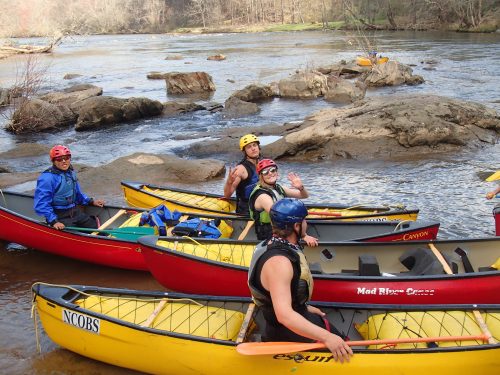
Students get ready to paddle tandem and solo canoes through a rapid on the French Broad River in Tennessee.
Certifications
A special offering included in many of our leadership programs is the opportunity to earn a Wilderness First Aid certification through the Wilderness Medical Institute. For three days during the Blue Ridge Mountains phase, students attend class with a certified wilderness medicine instructor to learn first aid skills specific to the backcountry. This certification is widely accepted as a baseline qualification for entry-level jobs in the outdoor industry.
In between all of the above elements of this phase, students are backpacking through the beautiful Blue Ridge Mountains, a well-known destination for outdoor enthusiasts. The Appalachians are some of the oldest mountains in the world and offer an ancient wisdom and beauty that is hard to find in other landscapes of the United States. Students learn to navigate on and off trail as they travel through rain, snow and sun beneath the forest canopy. Upon reaching their goal, they are treated to breathtaking views from the highest summits east of the Mississippi River. Students learn to cook for themselves, make their own camp, filter water, hang their food to protect it from hungry woodland creatures, and pack their packs comfortably and efficiently. Above all, students learn to work together as a crew, overcoming challenges and demonstrating compassion for their crewmates and for themselves.
During the first phase, we started sharing our life stories. We got real together; that’s when it started, how much we care about each other. -Maddy Riker, semester alum
Florida Phase
Phase 2
On the fall semester, students are transported from the cool, green forests of the Southern Appalachians to the warm, wet rivers of central Florida. On the spring semester, students explore the Florida Everglades; an ecosystem unlike any other in the world. A second duffel shuffle helps the crew switch out gear to make sure they’re dressed appropriately for the climate. In Florida, students learn to canoe in a coastal environment, which is quite different from what they’ve experienced in the Blue Ridge Mountains.
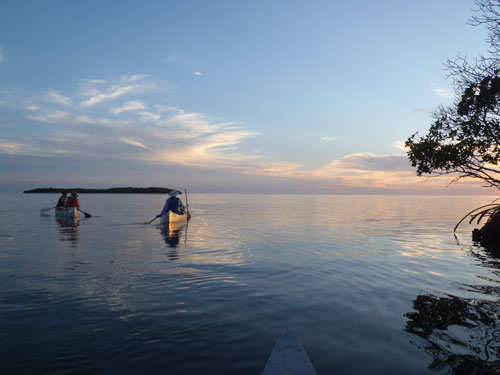
Students canoe on the coast of Florida.
Here, they get the opportunity to experience expedition-style canoeing. The crew brings everything they need in their boats with them, similar to their backpacks in the mountains. Students learn to navigate the marine landscape and gain experience in dealing with elements such as bugs, heat and sand. The Florida phase also provides students the ability to see more threatened and endangered species than they do in other course areas. The natural and cultural history of Florida is a central part of this curriculum, as the human impacts on the area are so pronounced.
Finishing that last paddle in Florida, at 2 a.m., after paddling 19 hours, almost half of it in the dark … That was our greatest challenge. Even when we felt delirious, getting slapped by fish, none of us quit. -Zoe Kasper, semester alum
Solo
Because students spend so much time working and living together throughout the semester, a solo is often a welcome time. Solo is a designated period, lasting from hours to days, where students are given time to rest and reflect on their experiences in their own separate campsites. On a semester course, it is common to have a solo during each phase. Students are given the opportunity to have time alone to absorb the unique experiences of each region.
SOLO WAS MY GREATEST CHALLENGE. AFTER THAT MUCH TIME WITH PEOPLE, IT’S IMPORTANT TO HAVE TIME ALONE TO PROCESS. IT WAS GOOD, BUT IT WASN’T EASY!-Spencer Gordon, semester alum
Service
Similar to a solo, the crew participates a service project during each phase of the semester. These projects range from people-based projects in urban areas, like volunteering at a food bank or a school, to land-based service such as helping at a community garden or doing trail maintenance. Service is one of the guiding principles of Outward Bound’s leadership programs and is a clear way for students to demonstrate values such as compassion and a commitment to excellence.
Patagonia Phase
Phase 3 for Fall Semesters (Phase 1 for Spring Semesters)
When the students reach Patagonia, they go through one last duffel shuffle to reset for the change in environment. This phase is often unlike anything the students have seen before; the Patagonian landscape is not imitated anywhere in the US.
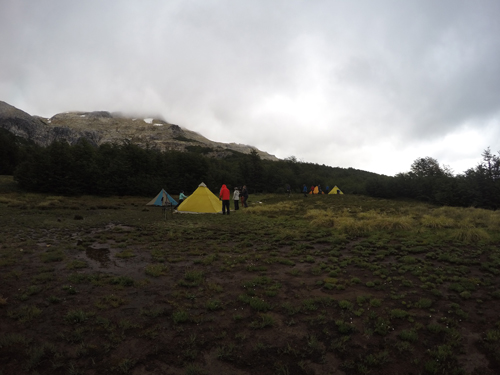
Camping in Patagonia
Students backpack through rugged forests; camping and visiting refugios, which are huts located strategically throughout the mountains to shelter hikers. They hike through exposed scree and talus fields on hard-to-follow trails, carefully zigzagging to avoid slipping or kicking off rocks.
WE GOT TO THE REFUGIO IN THE RAIN AND FOG, AND WE COULDN’T SEE ANYTHING… THE NEXT DAY WE WOKE UP AND COULD SEE FOREVER, AND WE REALIZED WHAT WE’D JUST DONE.-Nick Taylor, semester alum
Students also learn the technical skills needed to travel on glaciers. The first few days on the glacier are spent practicing safety techniques. Students learn to self-arrest on their own and with an ice axe should they find themselves sliding on the ice. They also learn how to safely walk in snowy and steep terrain. After individual safety is honed, the crew practices traveling as a rope team, which requires trust, communication and teamwork.
After crossing the glacier in Patagonia, when we were all safe, that was when I was most proud of us all. It was of utmost importance in that moment that we all work together, and when we made it, that’s when I knew we could make it through anything. -Lindsay Gursha, semester alum
The Patagonia phase isn’t just about mountains and ice. Like in the other regions, students embark on a solo and a service project while in Patagonia. During their service, students may have the opportunity to practice their Spanish while interacting with locals. This provides a cross-cultural experience that is just as important as skill acquisition.
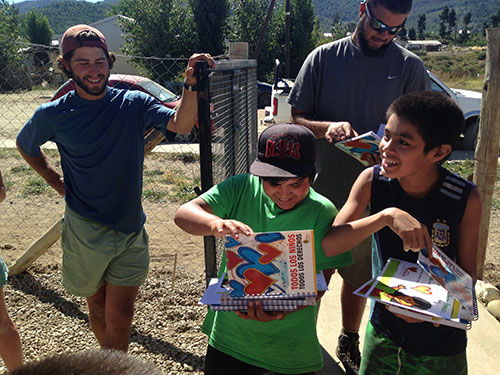
Students complete the service portion of their Outward Bound semester in Patagonia.
Whether you go on a fall or spring semester with Outward Bound, get ready to explore three wild and unforgettable regions of the world with a crew of strangers who, by the end of course, come together as a family. Not everyone knows what they’re looking for when they sign up for one of Outward Bound’s leadership programs, but by the time they leave, they’ve found it.
Getting on the plane to come on this course was the hardest thing I’ve ever done … Now after everything we’ve been through together, leaving this crew is the hardest thing I’ve ever done. -Jay Honnold, semester alum
About the Author
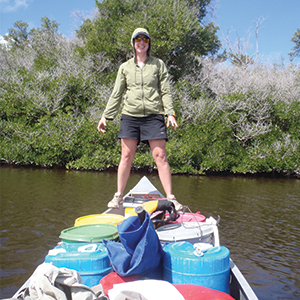
As a young girl growing up in Girl Scouts in northern Virginia, Lindsay always loved camping and other outdoor activities like rafting, horse packing and caving. It wasn’t until college, however, that she found out that a person could actually become a professional camper. This immediately became her life’s goal and she pursued it ferociously. After taking a 50-day Outdoor Leadership Course with the North Carolina Outward Bound School, Lindsay was hired there as an Assistant Instructor and the rest is history! She now has seven years with NCOBS under her belt, and has served the past two years as the Associate Program Director of the Table Rock base camp. She spends most of her time there course directing and visiting crews out in the Appalachian forests with her energetic puppy, Turbobiscuit.
OTHER POSTS YOU MAY LIKE
Read More
Read More
Read More




